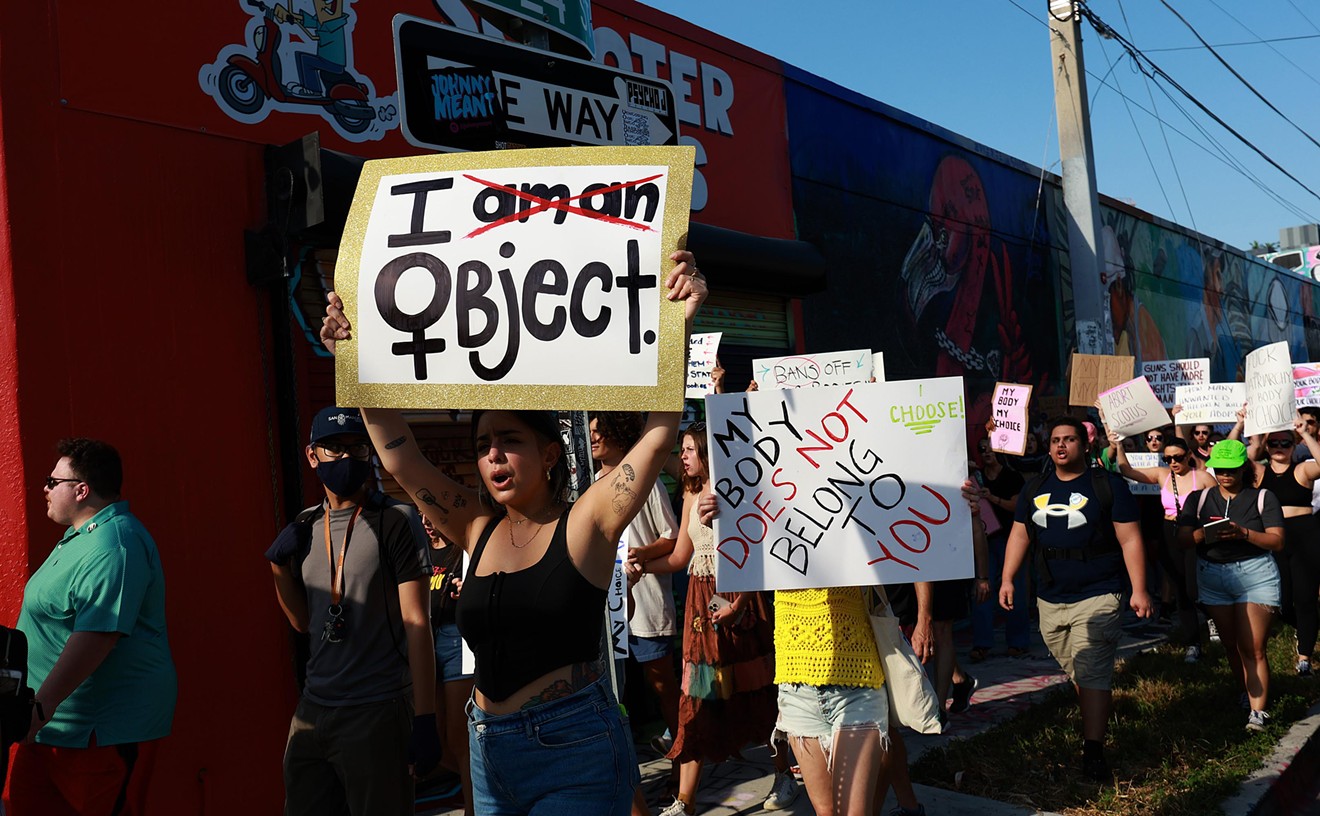In the three years since Marcus learned he'd contracted the affliction, he has gone from playing tennis daily to confinement in a wheelchair. Today he cannot use much of his body from the neck down. He is still able to move his arms, but his hands are paralyzed except for thumbs and index fingers. His legs are incapacitated and the muscles in his back and chest do not function. When sleeping he must use a ventilator so he won't suffocate.
Yet Marcus talks optimistically about the possible publication of his novel, titled Freedom Land. And he has found a new vocation: wheelchair warrior. In that capacity he is giving South Florida a crash course in the Americans with Disabilities Act (ADA), a federal law that protects the physically disabled from exclusion, segregation, or unequal treatment in their daily lives.
Marcus began his campaign in May of last year, after traveling to Naples, Florida, for a medical appointment. He and his girlfriend, Carol Durbin, checked into a Naples hotel that claimed to be handicapped accessible. It wasn't. Marcus got stuck in the bathroom and had to be carried out half-dressed. "I decided anyplace I can't get into, I'm going to sue," he recalls.
Since that incident Marcus has filed 137 federal lawsuits against South Florida property owners and businesses for violations of the ADA. (Individuals have the right to sue private businesses for violations of the ADA, which became law in January 1992.) He has brought suit against big corporations such as Kmart Corporation, Office Depot, Burger King, Mattress Giant, the Neiman Marcus Group, Colonial Bank, and the Eckerd Corporation. Small businesses also have felt the heat, particularly those in the neighborhood of his condominium building on North Bayshore Drive, near the former Omni Mall. He has sued the landlord of a sandwich shop, a Peruvian restaurant, a Nicaraguan café, a print shop, and a popular bar and grill, among others.
Some of his complaints have been filed through the nonprofit groups Access Now and Advocates for the Disabled, the latter an organization that has brought more than 500 ADA cases since 1998. Others the 54-year-old Marcus has sued individually with help from his sister Sherrie Marcus (an attorney) and his girlfriend, Durbin, acting as an ADA compliance consultant.
Marcus describes his zeal as an effort to leave behind a legacy. If just one other disabled person can frequent a business because of a lawsuit he brought, then his efforts will have been worthwhile. But even he admits that, so far at least, the people who have benefited most from his litigation have been lawyers. For example, in a recent case settled out of court, an attorney from a nonprofit advocacy group who represented Marcus garnered fees of about $20,000. (Marcus himself will receive $3500 in damages, which he says is the only time he has been compensated.) In addition the company he sued will have a very generous five years to make the necessary physical changes to its facility. "The way I view it, they paid off the attorney to make him go away," he complains.
Although he questions whether attorneys in such cases have been too eager to settle the lawsuits out of court, Marcus and Durbin both say the disabled wouldn't have any way to force a business to comply with the ADA if lawyers couldn't make money. "It is an industry," Durbin concedes. "If these people weren't sued, they wouldn't do anything. And if attorneys weren't making money, they wouldn't file suits."
Daniel Holder, acting director of the Miami-Dade office of the ADA, which oversees county government adherence to the law, speculates that frustration over lack of compliance may have sparked the proliferation of court action in recent years. The U.S. Department of Justice, which is charged with enforcing the ADA, does not go after small private businesses. "People with disabilities say [a lawsuit] is the only way we're going to get this done," Holder reports.
Although the law has been on the books for more than eight years, some business owners and landlords say they're unaware of its provisions. Cheepo's Copy and Print Center, located at 2801 Biscayne Blvd., installed a handicapped parking space with a sign when it opened for business two years ago, says owner James Calella. But because the city didn't require other accommodations, Calella thought he had fully complied with the ADA. If someone in a wheelchair visits the business, Calella says, he steps outside, to the person's vehicle, to pick up or deliver printing jobs.
Calella's landlady, Dorothy Lund, admits she too was unaware of the ADA requirements until Marcus filed a lawsuit against her this past October. On the recommendation of Sherrie Marcus, Lund hired Carol Durbin to prepare a report detailing ADA violations at the property. Lund says Durbin charged her for three hours of work at $125 per hour. Calella and Lund agreed to split the cost of improvements, such as installing a ramp and paving the lot where the handicapped space is located. Lund wants to settle the lawsuit out of court, but a resolution hasn't yet been negotiated.
According to attorney Marcus, most property owners served with an ADA lawsuit are eager to settle and thus save on the high cost of hiring a lawyer. (Of the twenty suits she has handled, Marcus says, none has gone to trial.) Still, a property owner may end up negotiating a settlement that results in very expensive -- and sometimes unnecessary -- remodeling. Daniel Holder says ignorance of the law, or a willful avoidance to comply with it, contributes to excessive costs. "As long as businesses are not in compliance they are sitting ducks, and the attorneys know that," he observes. "If they have gone through the process to comply, then they are defensible and chances are the attorneys will go on to someone who is not in that position."
(Existing businesses are allowed considerable leeway under the ADA. They are required only to make changes that are "readily achievable," which is bureaucratese for remodeling that won't be financially ruinous. The Department of Justice and the Small Business Administration jointly publish a guide for small businesses. It's available online at www.usdoj.gov/crt/ada/smbusgd.pdf or through DOJ at 800-514-0301. TDD users can call 800-514-0383.)
To illustrate his motivation in filing so many lawsuits, Martin Marcus recently suggested lunch at the 1800 Club. Even though he sued the property owners last July because of their lack of ADA compliance, he likes the venerable bar and grill, located at 1800 N. Bayshore Dr., because the food is decent, it offers a sports channel he can't get at home, and it is literally right next door to his condominium. A caregiver guides him on the short but precarious journey from his building to the restaurant, during which he is forced to travel down the roadway because the sidewalk is too uneven for his wheelchair.
Marcus avoids the front door and its two steps, which would require him to tilt his wheelchair dramatically. The aide wheels Marcus down a sidewalk to the rear door and knocks. Employees hurriedly move tables and chairs out of the way. A kitchen employee and Marcus's aide lift the wheelchair over a five-inch-high step and into the restaurant. "They could easily make this accessible," he grouses as he eyes the step.
Although his lawsuit against the restaurant has been settled, Marcus has yet to see any remodeling. The settlement gave Ader Properties, owner of the building, a specific amount of time to complete the changes. Because the terms are confidential (including the attorney's fees paid), partner Robert Ader says he cannot reveal all the details, though he does confirm that the bathrooms will be redone at an estimated cost of $40,000 to $50,000 and that a ramp will be installed at the restaurant's rear door. (Owing to the slope and size of the entrance required, the door will have to be widened and the sidewalk leading to it realigned.)
But Ader has his own complaints. He says Marcus didn't need to slap him with a lawsuit in order to force changes. If he simply had been briefed about the ADA problems, Ader Properties would have undertaken the necessary remodeling. "I think he's obviously teamed up with lawyers to make some money," ventures Ader, who himself is an attorney.
Ader favors a bill introduced by Florida congressmen Mark Foley and E. Clay Shaw that would require plaintiffs in ADA cases to give 90-day notification before suing. That would allow small businesses time to achieve compliance before incurring the costs of settling or fighting a lawsuit. Marcus opposes the legislation. The 90-day notification period, he believes, will only encourage businesses to weasel out of their obligations. As long as a property owner has done something -- installed a handicapped space or inquired about a door ramp -- his or her attorneys could appeal to a judge for more time. "It's horseshit," he grumbles.
He returns to the subject of the recent settlement that allowed five years for compliance and warns that people can forget. And besides, he'll likely be dead by that time. "Then," he says grimly, "someone else will have to come along and sue."










